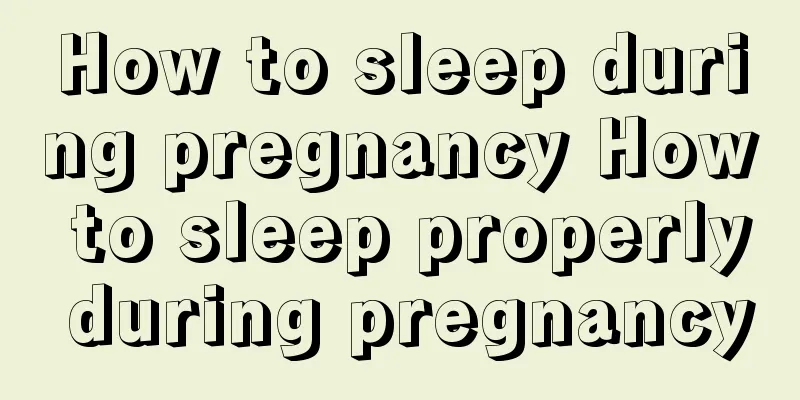What to do with postpartum hemorrhoids? How to treat postpartum hemorrhoids

|
Hemorrhoids are a very uncomfortable disease. Many people suffer from hemorrhoids in our daily lives. We often hear that women will get hemorrhoids after giving birth. There are many types of postpartum hemorrhoids. You can use ice packs to apply ice to the hemorrhoid area. You should also drink more water and eat more vegetables and fruits. What to do with hemorrhoids after childbirthPostpartum hemorrhoids are caused by physiological changes. It is often the most difficult for women to take medication during this period. It is not good to leave it untreated. Surgical removal is not suitable because the hemorrhoids will still regenerate after removal. Traditional oral and topical medications are even less suitable during this period. So do you know how to treat postpartum hemorrhoids? Next, let Mama.com Encyclopedia introduce you to the treatment methods for postpartum hemorrhoids. The early symptoms of hemorrhoids are blood on the surface of the feces or blood dripping from the anus. In severe cases, it may spray out. Internal hemorrhoids generally have a feeling of heaviness. Some feces may be squeezed out of the anus and then recover on their own. If it cannot recover, it may cause edema and pain. External hemorrhoids will swell and become exhausted. When inflamed or thrombosed external hemorrhoids are formed, the pain is severe, walking is difficult, and sitting is restless. Frequent bleeding causes anemia, dizziness, shortness of breath, fatigue, and poor spirits. Once the pressure in the lining of a pregnant woman is reduced after delivery, the venous return obstruction is relieved, and the hemorrhoids will shrink on their own within 3-4 months. Therefore, the focus of hemorrhoids in pregnant women is prevention, and non-surgical treatment is the main treatment. First of all, keep the bowels open to prevent constipation. In addition to paying attention to the completeness and sufficient quantity of nutrients in food, pregnant women should also eat more vegetables with more fiber, such as leeks, celery, loofah, cabbage, spinach, radish, etc., to increase intestinal peristalsis, and pay attention to drinking more water. Too little exercise is also one of the causes of constipation. Pregnant women should avoid sitting or standing for long periods of time, and should participate in more physical activities. It is best to develop the habit of regular bowel movements every morning, and do not hold back when you feel like defecating. When the stool is hard to pass, you can take some honey, sesame oil, bananas or oral paraffin oil and other laxatives. Do not use drugs such as Glauber's salt, rhubarb, senna leaves, etc. to prevent miscarriage. Treatment of postpartum hemorrhoids(1) Stage I and II internal hemorrhoids The symptoms of stage I and II internal hemorrhoids are mild, and internal hemorrhoid sclerosing agent injection therapy (such as 2% alum solution for hemorrhoidal injection) can be used to make the fibrosis shrink and harden, and the hemorrhoidal veins occlude to achieve the purpose of hemostasis and fixation. Stage III internal hemorrhoids are large in size, so ligation or laser removal can be considered. (2) External hemorrhoids and mixed hemorrhoids If inflammation, thrombosis, prolapse, or heavy bleeding occur frequently, group ligation or laser resection can be performed, but care should be taken during the operation to prevent postoperative anal stenosis. (3) Thrombotic external hemorrhoids (external hemorrhoid thrombosis) If the onset time is long, the pain is not severe, and the size is small, you can apply hemorrhoid cream locally to accelerate the absorption of thrombus. If the size is large, you can perform embolectomy under local anesthesia, and take a sitz bath with 0.05% potassium permanganate solution after defecation until the incision heals. Treatment of postpartum hemorrhoids with Chinese patent medicine or prescription (1) For patients with stasis type, it is advisable to activate blood circulation and remove blood stasis. You can take Neixiao Pills for Hemorrhoids, Shaofu Zhuyu Pills, Xiaozhi Pills, etc.; externally use hemorrhoid ointment and Huazhi suppositories. (2) For patients with damp-heat type, it is advisable to clear away heat and dampness, cool blood and stop bleeding. You can take Diyu Huaijiao Pills, Changfeng Huaijiao Pills, Zanglian Pills, etc.; externally use Mayinglong Musk Hemorrhoid Ointment, Jiuhua Ointment, and Wild Chrysanthemum Suppositories. (3) For those with blood deficiency, it is advisable to replenish blood and stop bleeding. You can take Guipi Pills, Ejiao Blood-Replenishing Paste, etc. For the elderly and weak, those who have hemorrhoids that are difficult to recover from prolapse, you can take Buzhong Yiqi Pills. How can pregnant women prevent hemorrhoids after delivery?It is better to prevent than to cure. No matter how much the body can recover after treatment, the body will be more or less damaged after the pain. If a pregnant woman gets postpartum hemorrhoids, it is not only difficult to cure but also extremely painful. So do you know how pregnant women can prevent postpartum hemorrhoids? Female friends should learn to love themselves. The following knowledge about how pregnant women can prevent postpartum hemorrhoids introduced by Mama.com Encyclopedia must be read carefully! Pregnant women are particularly prone to hemorrhoids; this is because pregnancy can cause increased abdominal pressure. As the uterus gradually enlarges, the pressure on the inferior vena cava increases, especially when the fetus is in an abnormal position, the pressure is more obvious, which directly affects the venous return of the lower rectum and anal canal, causing congestion and expansion of the hemorrhoidal veins, thereby inducing hemorrhoids. On the other hand, during pregnancy, there is generally less activity, gastrointestinal motility slows down, feces stay in the intestinal cavity for a longer time, and the water in the feces is reabsorbed, causing dry stools and difficulty in defecation. In short, it is generally not recommended to immediately perform surgical treatment after suffering from hemorrhoids in late pregnancy. You can choose the above conservative treatments and wait until after delivery for further treatment. This is because after delivery, with the reduction of abdominal pressure, the elimination of venous return obstruction, and the gradual reduction of progesterone content in the body, hemorrhoids will generally shrink or atrophy within 4 months. If the symptoms disappear at this time, the pain of surgery can be avoided; if hemorrhoids still exist, surgical treatment can be performed again. At this time, the hemorrhoids have become significantly smaller than during pregnancy, the pain of surgery will be relatively reduced, and the course of treatment will also be significantly shortened. Precautions for treating postpartum hemorrhoids1. Keep bowel movements smooth Develop the habit of regular bowel movements every day. Drink a glass of cold water when you get up in the morning to promote bowel movements. Do not read books or newspapers while defecating, otherwise you will ignore the urge to defecate, which will cause stagnation of stool over time, forming dry and hard feces that are difficult to excrete. It is not advisable to squat on the toilet for too long. Squatting or sitting for a long time can cause varicose vein bleeding. Pregnant women should avoid sitting or standing for a long time to prevent constipation. Taking sesame and honey appropriately can keep bowel movements smooth and reduce the occurrence of hemorrhoids. 2. Pay attention to food hygiene The diet should be light and laxative. It is advisable to eat fresh vegetables and fruits rich in fiber, such as celery, spinach, green vegetables, loofah, banana, sweet orange, persimmon, etc. Those with difficulty in defecation should eat porridge, noodles, soup noodles, etc. to reduce feces. Irritating foods will irritate the anal mucosa and skin, causing local congestion and burning pain, and aggravate the onset of hemorrhoids. Spicy, hot, greasy, fried, smoked and roasted foods and hair-raising foods should be avoided, such as chili, garlic, green onions, pepper, pork head, dog meat, mutton, etc. Avoid tobacco and alcohol. 3. Pay attention to anal cleanliness If there is a lot of perineal secretion, the anus should be cleaned with warm water after defecation or before going to bed, or with 1:5000 potassium permanganate solution. Change underwear frequently and dry it in the sun. 4. Treat the underlying disease Timely treatment of perianal and systemic diseases can reduce the occurrence of hemorrhoids, such as pinworm disease, trichomoniasis, perianal eczema, constipation, diarrhea, excessive leucorrhea, hypertension, heart disease, emphysema, diabetes, etc. 6. Keep exercising People who work in sedentary or standing positions for long periods of time should walk around for 10 to 15 minutes after working for 1 to 2 hours. They can also choose to do activities such as running, Tai Chi, aerobics, and work breaks, which can promote blood circulation and intestinal peristalsis, and reduce pelvic congestion and hemorrhoids. |
<<: Why does the baby's stool smell so bad? How to treat the baby's stool smelling so bad?
Recommend
Is it better to choose an electric or manual breast pump according to your own situation?
Choose according to your own situation. Electric ...
How to brush teeth during confinement? Can I use mouthwash during confinement?
How to brush teeth during confinement? Is this a ...
Who is Dai Jiaoqian's husband when she is pregnant? What are the symptoms before pregnancy?
The hot topic on Weibo today is undoubtedly that ...
How can women prevent cervical adhesions and avoid infertility?
With the development of society, female infertili...
What is the impact of ADHD on children in adulthood? What is the impact of ADHD on children?
Many parents know that ADHD in children has a ver...
Why does the baby keep crying? What should I do if the baby keeps crying?
I don’t know why my baby keeps crying recently, b...
Does gestational diabetes affect the IQ of the fetus? What should be paid attention to during gestational diabetes?
The chance of developing diabetes during pregnanc...
Can I eat apples after a caesarean section? What fruits can I eat after a caesarean section?
In order to reduce pain when giving birth, many p...
Good parental concepts naturally increase the chances of pregnancy
Recently, there have been frequent reports of cel...
What is going on when pregnant women feel dizzy and numb in their hands? Pregnant women need to be alert when they feel dizzy and numb in their hands
Once a woman is pregnant, she needs to pay attent...
Teach you how to beautify your breasts after childbirth and avoid breast problems
In addition to being happy about the healthy birt...
Can a one-year-old baby eat shiitake mushrooms? At what age can a baby eat shiitake mushrooms?
Shiitake mushrooms are a type of fungus food, and...
When should you start using a pregnancy pillow when you are 7 months pregnant?
It can be used when the pregnancy is 7 months old...
What is baby rice cereal made of? Which brand of baby rice cereal has the best reputation?
We all know that babies drink breast milk and for...
Is it better to eat bird's nest or fish maw after childbirth? Can fish maw and bird's nest be eaten together?
Bird's nest and fish maw are both foods that ...









